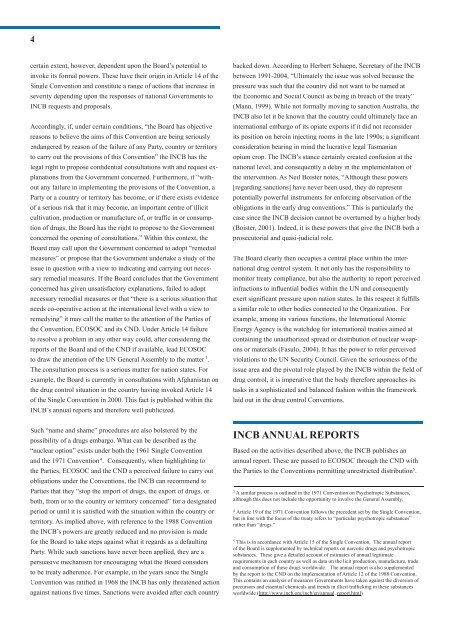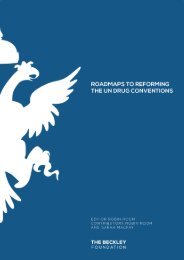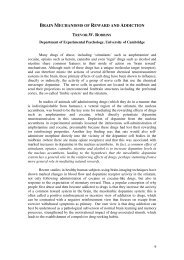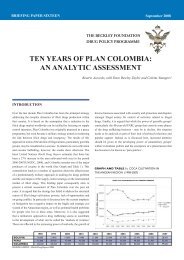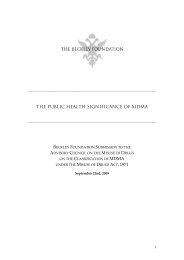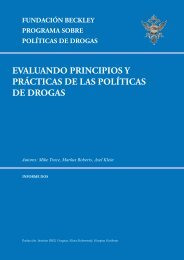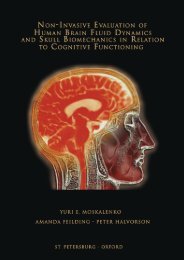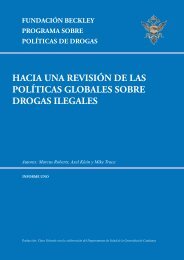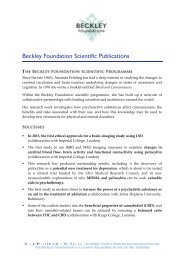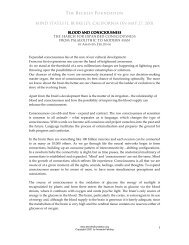Watchdog or Guardian of the UN Drug Control Conventions?
Watchdog or Guardian of the UN Drug Control Conventions?
Watchdog or Guardian of the UN Drug Control Conventions?
- No tags were found...
You also want an ePaper? Increase the reach of your titles
YUMPU automatically turns print PDFs into web optimized ePapers that Google loves.
4certain extent, however, dependent upon <strong>the</strong> Board’s potential toinvoke its f<strong>or</strong>mal powers. These have <strong>the</strong>ir <strong>or</strong>igin in Article 14 <strong>of</strong> <strong>the</strong>Single Convention and constitute a range <strong>of</strong> actions that increase inseverity depending upon <strong>the</strong> responses <strong>of</strong> national Governments toINCB requests and proposals.Acc<strong>or</strong>dingly, if, under certain conditions, “<strong>the</strong> Board has objectivereasons to believe <strong>the</strong> aims <strong>of</strong> this Convention are being seriouslyendangered by reason <strong>of</strong> <strong>the</strong> failure <strong>of</strong> any Party, country <strong>or</strong> territ<strong>or</strong>yto carry out <strong>the</strong> provisions <strong>of</strong> this Convention” <strong>the</strong> INCB has <strong>the</strong>legal right to propose confidential consultations with and request explanationsfrom <strong>the</strong> Government concerned. Fur<strong>the</strong>rm<strong>or</strong>e, if “withoutany failure in implementing <strong>the</strong> provisions <strong>of</strong> <strong>the</strong> Convention, aParty <strong>or</strong> a country <strong>or</strong> territ<strong>or</strong>y has become, <strong>or</strong> if <strong>the</strong>re exists evidence<strong>of</strong> a serious risk that it may become, an imp<strong>or</strong>tant centre <strong>of</strong> illicitcultivation, production <strong>or</strong> manufacture <strong>of</strong>, <strong>or</strong> traffic in <strong>or</strong> consumption<strong>of</strong> drugs, <strong>the</strong> Board has <strong>the</strong> right to propose to <strong>the</strong> Governmentconcerned <strong>the</strong> opening <strong>of</strong> consultations.” Within this context, <strong>the</strong>Board may call upon <strong>the</strong> Government concerned to adopt “remedialmeasures” <strong>or</strong> propose that <strong>the</strong> Government undertake a study <strong>of</strong> <strong>the</strong>issue in question with a view to indicating and carrying out necessaryremedial measures. If <strong>the</strong> Board concludes that <strong>the</strong> Governmentconcerned has given unsatisfact<strong>or</strong>y explanations, failed to adoptnecessary remedial measures <strong>or</strong> that “<strong>the</strong>re is a serious situation thatneeds co-operative action at <strong>the</strong> international level with a view t<strong>or</strong>emedying” it may call <strong>the</strong> matter to <strong>the</strong> attention <strong>of</strong> <strong>the</strong> Parties <strong>of</strong><strong>the</strong> Convention, ECOSOC and its CND. Under Article 14 failureto resolve a problem in any o<strong>the</strong>r way could, after considering <strong>the</strong>rep<strong>or</strong>ts <strong>of</strong> <strong>the</strong> Board and <strong>of</strong> <strong>the</strong> CND if available, lead ECOSOCto draw <strong>the</strong> attention <strong>of</strong> <strong>the</strong> <strong>UN</strong> General Assembly to <strong>the</strong> matter 3 .The consultation process is a serious matter f<strong>or</strong> nation states. F<strong>or</strong>example, <strong>the</strong> Board is currently in consultations with Afghanistan on<strong>the</strong> drug control situation in <strong>the</strong> country having invoked Article 14<strong>of</strong> <strong>the</strong> Single Convention in 2000. This fact is published within <strong>the</strong>INCB’s annual rep<strong>or</strong>ts and <strong>the</strong>ref<strong>or</strong>e well publicized.backed down. Acc<strong>or</strong>ding to Herbert Schaepe, Secretary <strong>of</strong> <strong>the</strong> INCBbetween 1991-2004, “Ultimately <strong>the</strong> issue was solved because <strong>the</strong>pressure was such that <strong>the</strong> country did not want to be named at<strong>the</strong> Economic and Social Council as being in breach <strong>of</strong> <strong>the</strong> treaty”(Mann, 1999). While not f<strong>or</strong>mally moving to sanction Australia, <strong>the</strong>INCB also let it be known that <strong>the</strong> country could ultimately face aninternational embargo <strong>of</strong> its opiate exp<strong>or</strong>ts if it did not reconsiderits position on heroin injecting rooms in <strong>the</strong> late 1990s; a significantconsideration bearing in mind <strong>the</strong> lucrative legal Tasmanianopium crop. The INCB’s stance certainly created confusion at <strong>the</strong>national level, and consequently a delay in <strong>the</strong> implementation <strong>of</strong><strong>the</strong> intervention. As Neil Boister notes, “Although <strong>the</strong>se powers[regarding sanctions] have never been used, <strong>the</strong>y do representpotentially powerful instruments f<strong>or</strong> enf<strong>or</strong>cing observation <strong>of</strong> <strong>the</strong>obligations in <strong>the</strong> early drug conventions.” This is particularly <strong>the</strong>case since <strong>the</strong> INCB decision cannot be overturned by a higher body(Boister, 2001). Indeed, it is <strong>the</strong>se powers that give <strong>the</strong> INCB both aprosecut<strong>or</strong>ial and quasi-judicial role.The Board clearly <strong>the</strong>n occupies a central place within <strong>the</strong> internationaldrug control system. It not only has <strong>the</strong> responsibility tomonit<strong>or</strong> treaty compliance, but also <strong>the</strong> auth<strong>or</strong>ity to rep<strong>or</strong>t perceivedinfractions to influential bodies within <strong>the</strong> <strong>UN</strong> and consequentlyexert significant pressure upon nation states. In this respect it fulfillsa similar role to o<strong>the</strong>r bodies connected to <strong>the</strong> Organization. F<strong>or</strong>example, among its various functions, <strong>the</strong> International AtomicEnergy Agency is <strong>the</strong> watchdog f<strong>or</strong> international treaties aimed atcontaining <strong>the</strong> unauth<strong>or</strong>ized spread <strong>or</strong> distribution <strong>of</strong> nuclear weapons<strong>or</strong> materials (Fasulo, 2004). It has <strong>the</strong> power to refer perceivedviolations to <strong>the</strong> <strong>UN</strong> Security Council. Given <strong>the</strong> seriousness <strong>of</strong> <strong>the</strong>issue area and <strong>the</strong> pivotal role played by <strong>the</strong> INCB within <strong>the</strong> field <strong>of</strong>drug control, it is imperative that <strong>the</strong> body <strong>the</strong>ref<strong>or</strong>e approaches itstasks in a sophisticated and balanced fashion within <strong>the</strong> framew<strong>or</strong>klaid out in <strong>the</strong> drug control <strong>Conventions</strong>.Such “name and shame” procedures are also bolstered by <strong>the</strong>possibility <strong>of</strong> a drugs embargo. What can be described as <strong>the</strong>“nuclear option” exists under both <strong>the</strong> 1961 Single Conventionand <strong>the</strong> 1971 Convention 4 . Consequently, when highlighting to<strong>the</strong> Parties, ECOSOC and <strong>the</strong> CND a perceived failure to carry outobligations under <strong>the</strong> <strong>Conventions</strong>, <strong>the</strong> INCB can recommend toParties that <strong>the</strong>y “stop <strong>the</strong> imp<strong>or</strong>t <strong>of</strong> drugs, <strong>the</strong> exp<strong>or</strong>t <strong>of</strong> drugs, <strong>or</strong>both, from <strong>or</strong> to <strong>the</strong> country <strong>or</strong> territ<strong>or</strong>y concerned” f<strong>or</strong> a designatedperiod <strong>or</strong> until it is satisfied with <strong>the</strong> situation within <strong>the</strong> country <strong>or</strong>territ<strong>or</strong>y. As implied above, with reference to <strong>the</strong> 1988 Convention<strong>the</strong> INCB’s powers are greatly reduced and no provision is madef<strong>or</strong> <strong>the</strong> Board to take steps against what it regards as a defaultingParty. While such sanctions have never been applied, <strong>the</strong>y are apersuasive mechanism f<strong>or</strong> encouraging what <strong>the</strong> Board considersto be treaty adherence. F<strong>or</strong> example, in <strong>the</strong> years since <strong>the</strong> SingleConvention was ratified in 1968 <strong>the</strong> INCB has only threatened actionagainst nations five times. Sanctions were avoided after each countryINCB ANNUAL REPORTSBased on <strong>the</strong> activities described above, <strong>the</strong> INCB publishes anannual rep<strong>or</strong>t. These are passed to ECOSOC through <strong>the</strong> CND with<strong>the</strong> Parties to <strong>the</strong> <strong>Conventions</strong> permitting unrestricted distribution 5 .3 A similar process is outlined in <strong>the</strong> 1971 Convention on Psychotropic Substances,although this does not include <strong>the</strong> opp<strong>or</strong>tunity to involve <strong>the</strong> General Assembly.4 Article 19 <strong>of</strong> <strong>the</strong> 1971 Convention follows <strong>the</strong> precedent set by <strong>the</strong> Single Convention,but in line with <strong>the</strong> focus <strong>of</strong> <strong>the</strong> treaty refers to “particular psychotropic substances”ra<strong>the</strong>r than “drugs.”5 This is in acc<strong>or</strong>dance with Article 15 <strong>of</strong> <strong>the</strong> Single Convention. The annual rep<strong>or</strong>t<strong>of</strong> <strong>the</strong> Board is supplemented by technical rep<strong>or</strong>ts on narcotic drugs and psychotropicsubstances. These give a detailed account <strong>of</strong> estimates <strong>of</strong> annual legitimaterequirements in each country as well as data on <strong>the</strong> licit production, manufacture, tradeand consumption <strong>of</strong> <strong>the</strong>se drugs w<strong>or</strong>ldwide. The annual rep<strong>or</strong>t is also supplementedby <strong>the</strong> rep<strong>or</strong>t to <strong>the</strong> CND on <strong>the</strong> implementation <strong>of</strong> Article 12 <strong>of</strong> <strong>the</strong> 1988 Convention.This contains an analysis <strong>of</strong> measures Governments have taken against <strong>the</strong> diversion <strong>of</strong>precurs<strong>or</strong>s and essential chemicals and trends in illicit trafficking in <strong>the</strong>se substancesw<strong>or</strong>ldwide (http://www.incb.<strong>or</strong>g/incb/en/annual_ rep<strong>or</strong>t.html )


